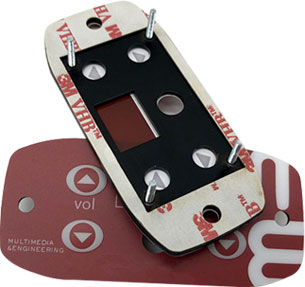
Graphic Overlay – PET/PC is usually the overlay material of choice due to its fantastic chemical resistance and flex property. Komkey offers membrane switch customized design services such as digital printing, screen-printing, or apply both methods to ensure you get the right colors, textures and finish your membrane switch design requirements.
Adhesive Overlay – This adhesive layer sticks the membrane switch overlay to the top circuit layer, and is usually an acrylic adhesive. The material is the same as the fourth layer. Only the thickness is maybe different according to the actual situation.
Top Circuit Layer – The material of this layer is specific. It is a 0.1mm thickness thermostable PET film printed with conductive silver ink and also dielectric oil, which used for fastening metal domes.
Circuit Spacer – This layer separates the top circuit from the bottom circuit so that the touch membrane remains normally break until the membrane switch keypad is pressed. The circuit spacer is a polyester spacer with adhesive on both sides.
Lower Circuit Layer – This layer is a 0.1mm-0.25mm thickness thermostable PET film printed with conductive silver ink and also dielectric oil. This layer terminates as a flexible tail that serves as an interconnector to controller PCBs or other IC.
Rear Adhesive – This adhesive layer bonds the entire membrane switch to the product surface, housing, or to a rigid support panel. Komkey, one of the membrane switch keypad suppliers, can use the proper adhesive type and thickness to bond your membrane switch to your equipment.
| Mechanical Properties: | |
| Life Expectancy | Flat type ≥ 5 million times, Tactile type ≥ 1 million times |
| Operation Force | Flat Type 57-284g ,Tactile Type 170-397g |
| Dome Rebound Time | ≤6ms |
| Tail Bending Performance | ≤180° |
| Switch Stroke | Flat 0.1~0.5mm,Tactile 0.6~1.5mm |
| Vibration | 20G's max. |
| Thickness | 0.7~1.5 mm |
| Electrical Properties: | |
| Rated Voltage | ≤50V DC |
| Rated Current | ≤ 100mA |
| Operating Power | ≤1W |
| Insulation Resistance | ≥100MΩ (250V DC) |
| Loop Resistance | 10Ω~2kΩ (Depending on the design) |
| Contact Resistance | 0.5 ~ 5Ω (Depending on wire length and the materials) |
| Wire Lead Resistance | <1Ω/cm |
| Base Material Voltage Withstand | 1500V DC |
| Environmental Properties: | |
| Operation Temperature | -40°C to +80°C (-40°to 176°F) |
| Storage Temperature | -40°C to +85°C (-40°to 185°F) |
| Atmospheric Pressure | 86 ~ 106 kPa |
| Humidity | +40°C, 90%~95%RH for 240 Hours |
Our Membrane Switch Pad Advantages
Beautiful appearance, Variety color printing.
Small size, light in weight, good tactility, Long life span.
moisture-proof, dustproof, waterproof, anti-corrosion, and erosion of harmful gases proof.
Easy to operate, intuitive, safe and reliable
Cost-effective, convenient installation
Komkey is one of the reliable membrane keyboard suppliers offering custom membrane keypad design service
Customized specification is available, the Smaller volume can be accepted.
Customized logo/Brand/Contact way can be printed in the overlay for advertisement.
 Call us on:
Call us on:  Email Us:
Email Us:  #609, Zhongyang Business Building, Fuyong village, Baoan District, Shenzhen
#609, Zhongyang Business Building, Fuyong village, Baoan District, Shenzhen